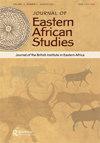谁执政?索马里国家与圣战政治秩序
IF 0.6
3区 社会学
Q2 AREA STUDIES
引用次数: 1
摘要
摘要为什么索马里政府未能提供公共秩序和基本服务,而青年党在其治理目标上却相对更成功?为了解释治理成功的这种变化,我们对战时秩序的制定提供了政治经济学解释,这种秩序的制定是基于治理行为者为维护其权力而创造的相互竞争的讨价还价。我们确定了索马里的两个关键政治交易:(1)索马里联邦政府成员和联邦成员国之间达成的精英协议;以及(2)青年党直接与其控制下的公民达成的民事协议。看看这两项协议,我们将研究获得外国支持如何影响治理行为体的税收动力,以及随后对治理的承诺。我们的研究结果表明,外国的支持不仅会破坏公民和国家之间正常的税收保护关系,而且还会无意中为圣战分子提供建立替代形式秩序的机会。本文章由计算机程序翻译,如有差异,请以英文原文为准。
Who governs? State versus jihadist political order in Somalia
ABSTRACT Why has the Somali government failed to provide public order and essential services, while Al-Shabaab has had relatively more success in its governance objectives? To explain this variation in governance success, we offer a political economy explanation of wartime order-making based on the competing bargains that governing actors create to uphold their power. We identify two key political bargains in Somalia: (1) an elite deal, forged among members of the Somali Federal Government (SFG) and Federal Member States (FMS); and (2) a civilian deal, which Al-Shabaab directly establishes with the citizens under its control. Looking at these two deals, we examine how access to foreign support can affect a governing actor’s taxation impetus, and subsequently its commitment to governance. Our results reveal that not only can foreign support undermine the normal taxation-protection relationship between citizen and state, but it can also inadvertently provide jihadists with an opportunity to establish alternative forms of order.
求助全文
通过发布文献求助,成功后即可免费获取论文全文。
去求助
来源期刊

Journal of Eastern African Studies
AREA STUDIES-
CiteScore
3.30
自引率
7.10%
发文量
12
期刊介绍:
Journal of Eastern African Studies is an international publication of the British Institute in Eastern Africa, published four times each year. It aims to promote fresh scholarly enquiry on the region from within the humanities and the social sciences, and to encourage work that communicates across disciplinary boundaries. It seeks to foster inter-disciplinary analysis, strong comparative perspectives, and research employing the most significant theoretical or methodological approaches for the region.
 求助内容:
求助内容: 应助结果提醒方式:
应助结果提醒方式:


